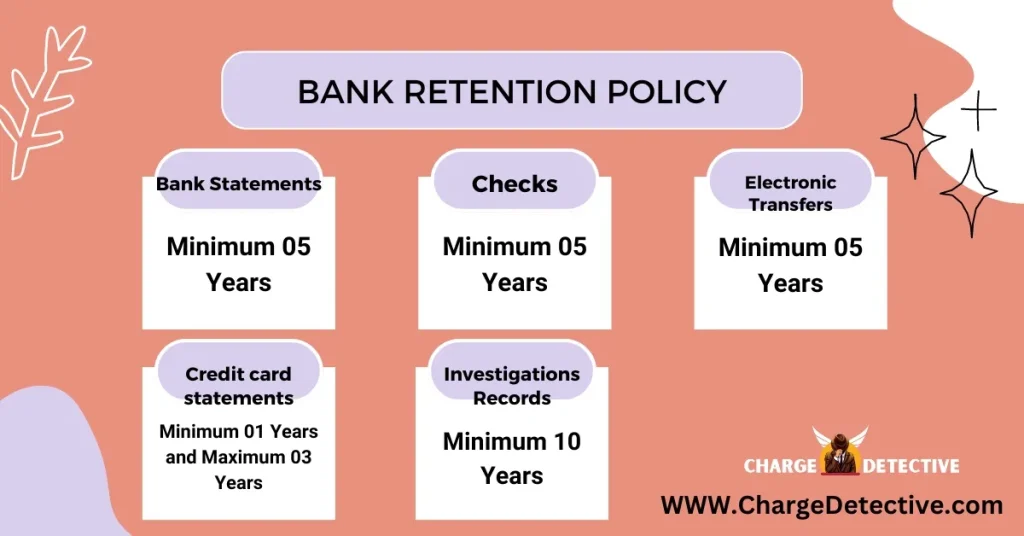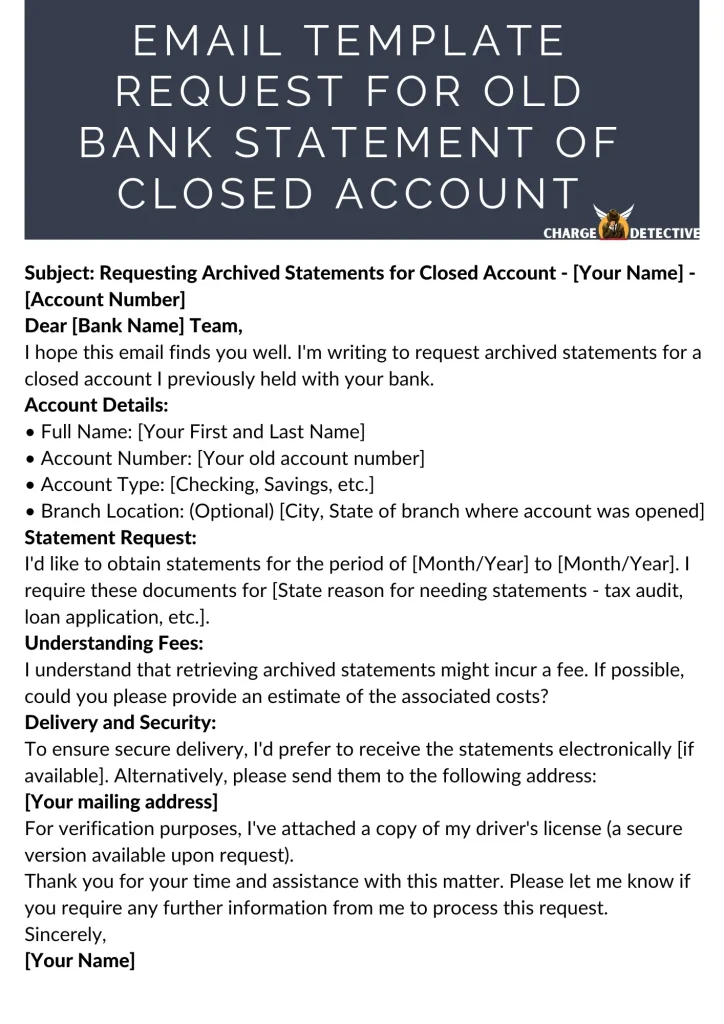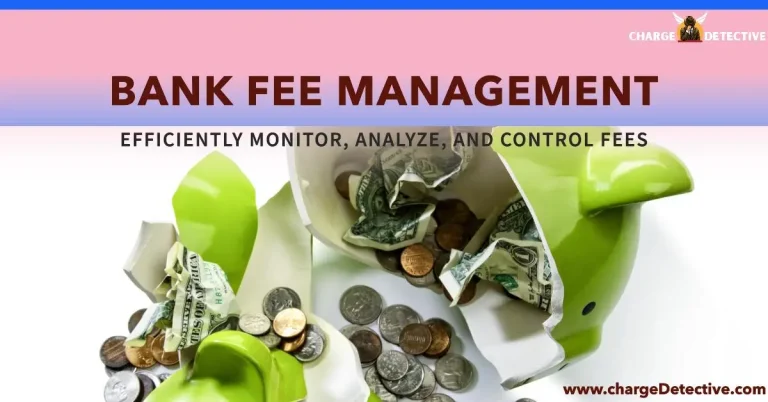Retrieve Closed Account Bank Statements | Quick Solutions
Can you get old bank statements from a closed account? If not, then you are in the right place to get to know about it because recently, I have experienced it and found that:
There are two main methods, One method is to approach your bank directly via phone, email, or in person by providing your necessary information, such as your account number, account title, date of birth, range of dates, etc. Banks usually offer statements either electronically or by physical mail. Ask about any fees associated with retrieving older statements.
The second method is to reach out physically to the branch. Although it is less common today, some banks require it in some cases, such as when an account has been closed for a while, and the bank does not have digital records. Bring valid government-issued identification. The branch staff will ask you to fill out a formal request form.
This comprehensive guide will provide you with in-depth information about why you want to get one, how long banks keep records, understand bank record retention policies, and challenges and solutions to get it, so stay with me!
Why do you get old bank statements from a closed Account?
There are several reasons which are listed below:
Tax Documents
Banks usually send tax documents like Form 1099 to customers for closed accounts, but these can sometimes be lost. Retrieving old bank statements can help with tax filings by verifying income, interest, and tax deductions.
Loan Application
When an applicant applies for a loan, lenders require old bank statements to check the history of the applicant’s financial activities, proof of income, and economic stability.
Reconciliation of Past Transactions
It is essential because if your closed account was linked with another account and you are still using it, old bank account statements help reconcile past transactions to find any discrepancies and lost information.
Investment Tracking
Old statements are essential to track the activities of investment, past performance, and capital gain or loss.
Insurance or Legal Purposes
Closed account old statements may be needed for insurance or legal matters related to any financial activity.
Own Record Keeping
Most people prefer to keep a complete record of all their financial transactions, even if the account is closed.
Read More: Bank Fee Management
How long do Banks keep your Bank Statements on record?
According to the Office of the OCC (Comptroller of the Currency), an independent bureau of the U.S. Department of the Treasury, banks should keep records for at least five years for any deposit over $100; it can be a longer period if banks choose to do so.
Credit card statements with no-tax-related expenses should be kept for at least 01 year and tax-related for at least 03 years.

Most banks require that documents be retained for at least five years. The documents that are related to the tax must be retained for at least 05 years as per the recommendation of the IRS (Internal Revenue Services).
Document retention maximum period is at least 07 years depending on the bank’s retention policy.
In the case of a Negotiable instrument like a check, the bank must return the actual canceled check along with the statement or keep copies or images for five years.
In case of an electronic funds transfer, the bank must retain records for at least 05 years.
Federal law requires banks to retain records and statements for accounts that are the subject of an investigation or a legal proceeding for at least ten years.
Banks keep account statements and records of closed accounts for a more extended period than required by law, sometimes up to 10 years. This protects them from possible disputes, claims, or audits.
Most banks store financial information for a minimum of five years and a maximum of up to ten years; if banks do not keep records, they violate the rules of the Bank Secrecy Act.
Important Note: This record retention policy also depends on the country to country and their local government rules for banks and, most importantly, the central bank of that country, which governs all the banks of that country.
Do you want to Read More Related to Unknown Charges? LH Trading on Bank Statements: A Comprehensive Breakdown
Do you have to pay a fee to retrieve older bank statements?
Yes, there can be charges. Below is an overview of the fees:
Retrieval of Statement Fee
Probably the most common fee. Banks will charge you a fee based on each statement. The amount can vary from $5 to $50 based on the age and type of statement fee. A higher fee may be charged for older statements if they are stored off-line. This is due to extra labor.
Delivery Type Fee
Even though electronic delivery may be free, banks charge more for delivery services like overnight mail or physical delivery.
Important Note:
You may have to wait several weeks or even many months before you receive the requested statements. The bank might need some time to retrieve archived documents.
Understanding Bank Policies
If the account has been closed at the customer’s request or by the bank itself, it is important to understand the bank policies deeply:
| Aspect | Details |
| Federal Regulations | Require banks to retain certain records like electronic transfers and checks for a specified period after account closure is 05 years. |
| Typical Bank Retention | Often retain records for 7-10 years beyond the minimum retention period. |
| Archiving | After 10-15 years, records might be archived on microfilm or digital storage. |
| Record Destruction | Banks may destroy records older than 20-30 years based on their policy. Not mandatory, very old records might still be available. |
| Retrieving Archived Records | Requires manual retrieval, leading to time and fees (typically $5-$50 per document). |
| Accessing Very Old Records | May be difficult or impossible due to limitations in retrieving archived data. |
| Consumer Financial Protection Act | Prohibits reopening closed accounts without consent to avoid unfair fees and harm. |
| Finding Specific Policies | Contact your bank directly for their specific record retention policy. |
| Overall Difficulty | Accessing information from can be costly and time-consuming. |
| Retention Length | Banks often keep records well beyond regulatory minimums. |
Email Request Template to Get an Old Bank Statement
Below is the email request template which you can send:

Challenges and Solutions
Below are the challenges and solutions in a tabular form:
| Challenge | Solution |
| Limited Retention Period | The solution is a Proactive approach, Request copies of important documents before account closure. Contact your bank directly to inquire about their data retention policy. |
| Potential Fees | Negotiate fees with the bank, especially for a large volume of statements. Explore electronic delivery options as they’re typically cheaper than physical copies. |
| Verification Requirements | Gather necessary information like account details, Social Security number, and date of birth beforehand. Be prepared to answer verification questions from the bank. |
| Difficulty Access to Very Old Records | Contact your bank immediately to improve record retrieval. Understand that old data may be unretrievable. |
| Time Taking Process | Expect delays, especially with older bank records. Get all the details upfront to speed things up. |
| Incomplete Statements | Ask the bank why the statements have gaps and for a complete record. |
| Received wrong statements | If you get statements for the wrong account, double-check account numbers and transactions, and notify the bank immediately. |
| In-Person Request | If your bank requires a branch visit, make an appointment. |
| Online access unavailable | Understand that old accounts with physical statements may not be accessible online. |
Can Old PDF Bank Statements be Converted to Excel?
It can be converted to Excel. Consider these alternatives. OCR converts PDFs to editable text. Popular choices include Adobe Acrobat Pro. These programs OCR PDF characters into digital texts.
Many free internet converters offer OCR. They are good for occasional document conversions, although file size and precision should be improved.
can Banks Reopen Closed Accounts?
Banks may be able to reopen it, but it depends on the reason for closure and the bank’s policies. Account closure initiated by customer in which If you closed the account in good standing, banks are more likely to reopen it with no problems.
But if Account closure initiated by the bank, This is trickier and the reasons for closure like excessive overdrafts or suspicious activity make reopening less likely. You’ll need to resolve any outstanding issues and convince the bank you’re a responsible customer again. It’s always best to contact your bank directly to inquire about their policy.
FAQs – Frequently Asked Questions
Conclusion
You can retrieve old bank records, though it may be challenging. You will have a greater chance of success if you are prepared with the right solutions and understand what challenges lie ahead.
It is important to remember that clear communication, proactive information collection, understanding of retention policies for old bank records, and a bit of patience will go a long way toward helping you navigate this process.
Once the statement is obtained, many AI-infused OCR tools make it simple to convert even old bank PDF statements into Excel/CSV format. Don’t refrain from assuming that closed accounts are lost forever. With a concerted effort, you can often access the bank records you need.



